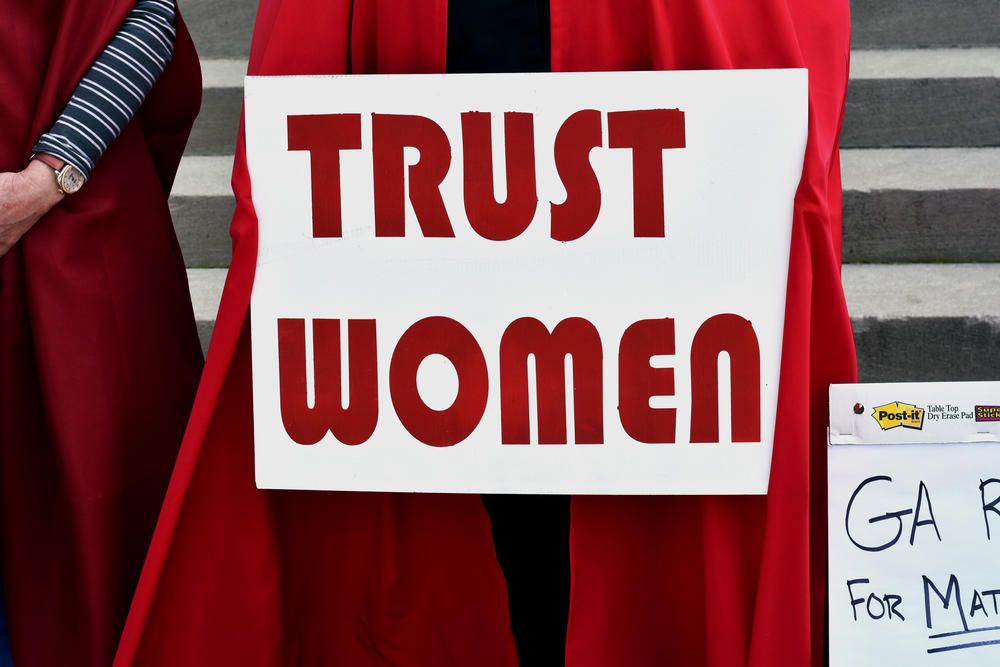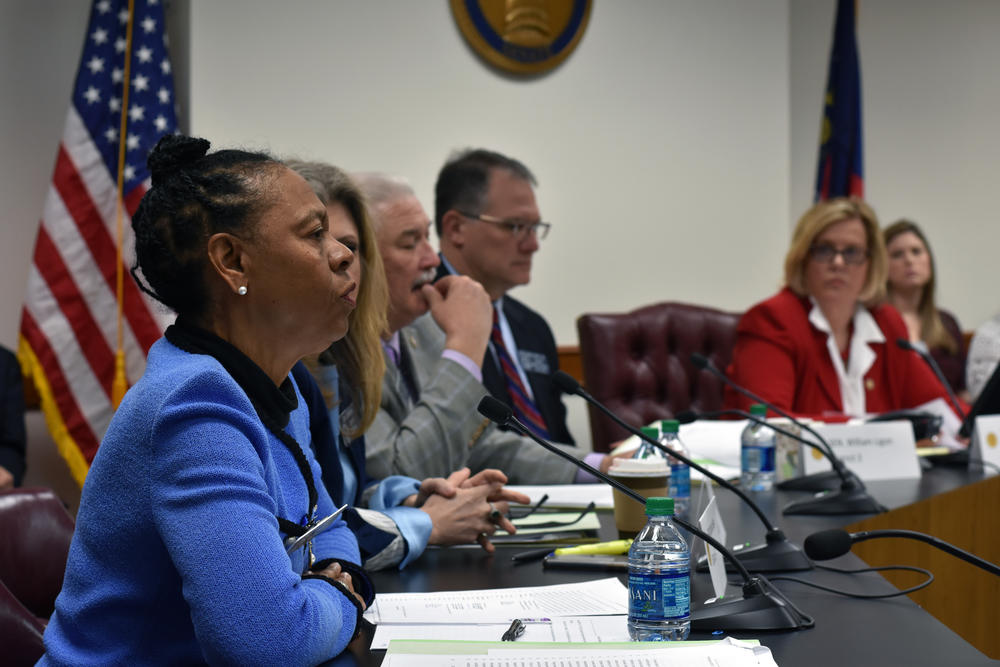Section Branding
Header Content
How Georgia's 'Heartbeat' Abortion Bill Is Aimed At The Supreme Court
Primary Content
By the end of the week, the Georgia Senate could join the ranks of other state legislatures when they vote on a so-called “heartbeat bill” that would effectively ban abortions about six weeks into pregnancy.
While the proposed restrictions grab headlines, abortion rights opponents say the aim of this type of bill isn’t only to limit access to the procedure, but also to trigger a Supreme Court challenge to federal protections for abortion.
Both abortion rights advocates and opponents say language in Georgia’s bill could make the case.
When a bill that would give Georgia the toughest abortion laws in the country moved out of a Senate committee Monday, protests were loud and to the point.
A rallying cry of “Shame!” reverberated through the top floor of the state capitol, but far from feeling shame, legal watchers say supporters of tighter restrictions on abortion expect and even welcome this type of reaction.
That's because on paper, these bills would mostly end abortions once doctors detect a heartbeat, which is around six weeks into pregnancy.
But the bigger payoff would be passing a bill so unconstitutional that abortion has to be considered again by the U.S. Supreme Court, and that would have implications across the country.
'Heartbeat' Bills Nationwide
Heartbeat bills in other states have been stopped by other judges, but none of them have been heard by the top court.
In 2018, Iowa’s state supreme court ruled a woman’s right to have an abortion was guaranteed in its state constitution. Bills in Arkansas and North Dakota have been blocked by the 8th Circuit in the U.S. Court of Appeals.
Just last week, a federal judge in Kentucky temporarily blocked that state’s heartbeat law.
Martin Cannon is a lawyer with the anti-abortion non-profit Thomas More Society based in Chicago. He represented Iowa in one of its many heartbeat bill lawsuits.
He says states are rushing to pass abortion-related bills - whether it’s tougher restrictions in Georgia or adding protections like New York just did. And states are doing so in case the Supreme Court overturns Roe v. Wade, the decision that made abortion a federal issue.
“If Roe is reversed, it doesn't just make abortion illegal everywhere,” he said. “It restores the issue to the legislatures, and not just the state legislatures but the federal legislature. It makes it something that we can debate again and pass laws about.”
Cannon also says that’s the reason Georgia’s bill is different than Iowa’s, or Tennessee’s, or any other state for that matter. While the general push to pass a heartbeat bill is nationwide priority for abortion rights opponents, there is no one cookie-cutter bill that is preferred.
“The chemistry from state to state varies, along with the personalities in the state legislatures,” Cannon said. “When some outfit drafts some proposed language and everybody just decides to use that it creates kind of a monolithic quality of things that can be dangerous.”
While these unique versions of the bill are helping other states prepare for a post-Roe era, anti-abortion groups think Georgia’s bill will actually be the one to get challenged in the Supreme Court.
Tax Provisions
Joshua Edmonds, executive director of the abortion-opposing Georgia Life Alliance, says that’s because Georgia’s heartbeat bill goes further than others. For instance, it would allow Georgians to claim an embryo as a dependent on their taxes just as they would an infant.
“There's tax provisions, there's child support provisions, there's a population count provision… in addition to the provisions that deal with limiting access to abortion for children who have a heartbeat,” he said. “Because there’s a wider scope of looking at a child across our state code it makes it a more novel question.”
Edmonds is optimistic that rather than the abortion restrictions, it’s calling for child support for embryos, counting them in the census and the tax break -- essentially legislating personhood – that could propel a Georgia heartbeat law to a hearing before the Supreme Court.
Rep. Dar’Shun Kendrick, a Democrat from Lithonia, made headlines after the House passed a version of the bill by introducing a “testicular bill of rights” legislation that would do things like ban vasectomies and require men to get permission before getting a prescription for erectile dysfunction medication.
MORE: Lawmaker Who Opposes Abortion Bill Proposes Anti-Vasectomy Legislation
Her proposal that men would be required to pay child support once a heartbeat is detected was added in to the current version of the bill, but she is still opposed to it, and said legal challenges would come as soon as Gov. Brian Kemp signed it.
The Supreme Court
Kendrick also said if the Supreme Court does hear the case, she doesn’t think they would side with supporters of the heartbeat bill.
“If [the supporters’] strategy is to make it a test case, I think it’s a bad strategy,” she said. “I don’t think they quite understand sort of the history of the Supreme Court and the decisions that they’re willing to overturn.”
That history is the legal principle of stare decisis, which basically says the court will defer to a previous decision, even if today’s justices may disagree with it.
Edmonds says the best hope anti-abortion groups have runs through Georgia.
“[The Supreme Court of Georgia] and the [U.S. Court of Appeals for the] 11th Circuit that covers Georgia are friendlier to this issue than any other state supreme courts and other circuits are,” he said.
Republican Gov. Brian Kemp vowed on the campaign trail to pass the “toughest abortion laws in the country,” a designation he would temporarily get until a likely court challenge would halt enforcement of the bill.
HB 481 could be debated on the Senate floor as early as Friday.





